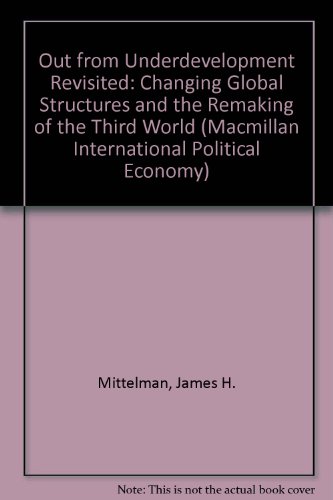Inhaltsangabe:
'This is a very timely updating of the very useful 1988 edition. It takes account of major intervening changes in world political economy, notably the collapse of 'real socialism' and the dominance of neoliberal economic policy, despite which Mittelman and Pasha provide reasoned and plausible assurance that there can be alternative paths to development. Pasha's collaboration reinforces Mittelman's disposition to view the problems from the social and cultural perspectives of the subjects of development and to analyse these problems in terms of the contest of social forces that lies behind the often obscuring screens of ethnicity and religion. A clear and accessible writing style makes this book, like its predecessor, ideal for teaching and for the concerned reader.' - Robert W. Cox Development may be best understood in terms of the interplay among capital accumulation, the state, and class. Subject to globalizing structures, classes, in turn, are examined in light of their interactions with culture, especially gender and religion as well as ecology. Case-studies - Brazil, the Asian newly industrializing countries, China, and Mozambique - reveal three possibilities for overcoming underdevelopment: joining, leaving, or weaving through global capitalism. The conclusions do not fail to present specific principles upon which policies can be based.
Reseña del editor:
'This is a very timely updating of the very useful 1988 edition. It takes account of major intervening changes in world political economy, notably the collapse of 'real socialism' and the dominance of neoliberal economic policy, despite which Mittelman and Pasha provide reasoned and plausible assurance that there can be alternative paths to development. Pasha's collaboration reinforces Mittelman's disposition to view the problems from the social and cultural perspectives of the subjects of development and to analyse these problems in terms of the contest of social forces that lies behind the often obscuring screens of ethnicity and religion. A clear and accessible writing style makes this book, like its predecessor, ideal for teaching and for the concerned reader.' - Robert W. Cox Development may be best understood in terms of the interplay among capital accumulation, the state, and class. Subject to globalizing structures, classes, in turn, are examined in light of their interactions with culture, especially gender and religion as well as ecology. Case-studies - Brazil, the Asian newly industrializing countries, China, and Mozambique - reveal three possibilities for overcoming underdevelopment: joining, leaving, or weaving through global capitalism. The conclusions do not fail to present specific principles upon which policies can be based.
„Über diesen Titel“ kann sich auf eine andere Ausgabe dieses Titels beziehen.
![]()
